Report on Legal Principles: Nulla Nulla Shire Council Transactions
VerifiedAdded on 2023/01/23
|10
|2700
|91
Report
AI Summary
This report provides a detailed analysis of legal issues arising from transactions involving the Nulla Nulla Shire Council. It examines four distinct transactions, applying principles of Australian contract law, including offer and acceptance, consideration, and breach of contract. The report addresses the validity of contracts, the impact of mistakes, and the application of equity law, including promissory estoppel. It explores issues such as the formation of contracts, unilateral offers, and the doctrine of frustration. Each transaction is analyzed separately, with specific legal principles and case authorities cited to support the conclusions. The report offers advice to the council on how to resolve each issue, considering potential legal actions and equitable remedies. The analysis covers a range of contract law concepts, providing a comprehensive overview of the legal challenges faced by the council and offering practical recommendations for resolution.
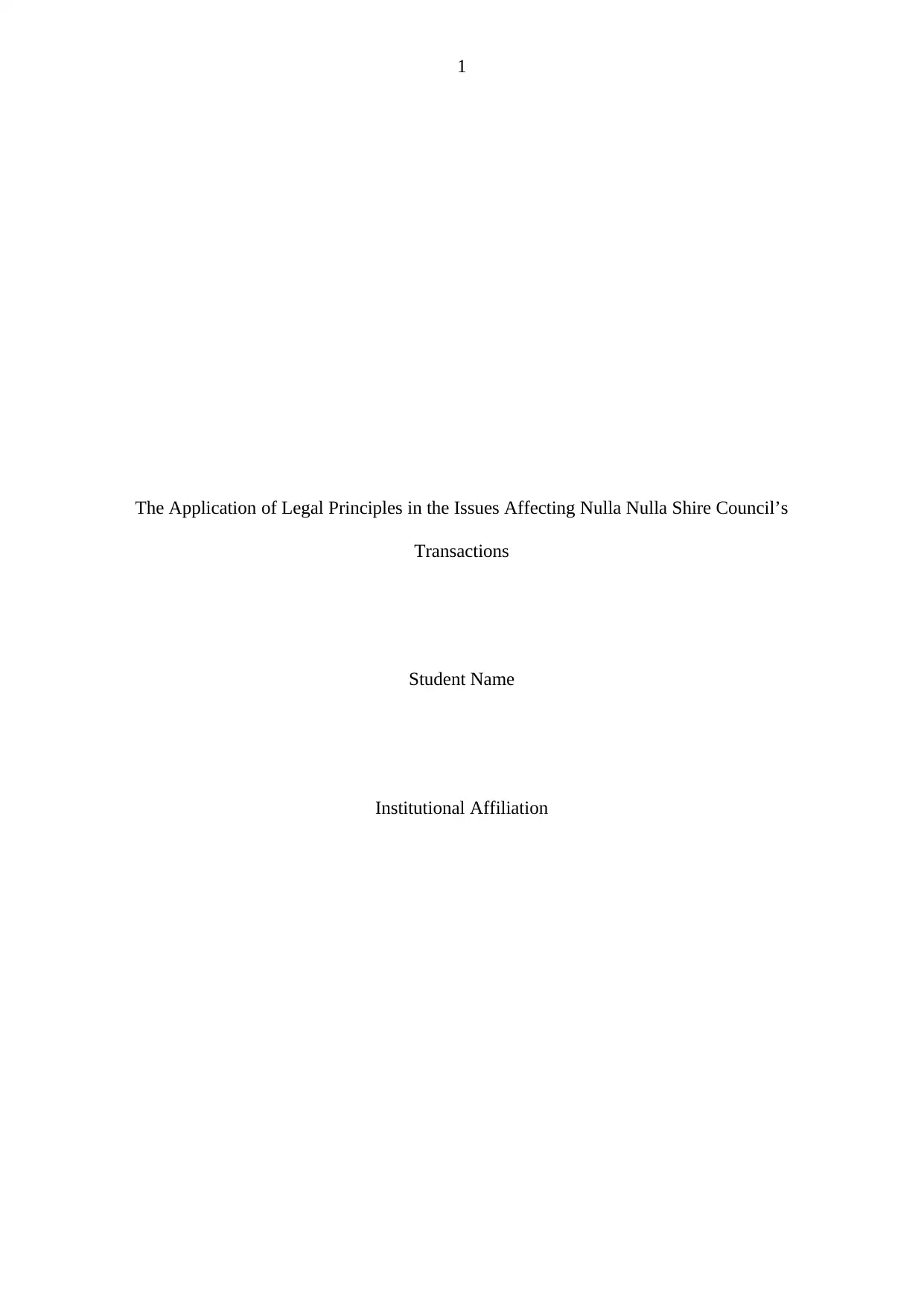
1
The Application of Legal Principles in the Issues Affecting Nulla Nulla Shire Council’s
Transactions
Student Name
Institutional Affiliation
The Application of Legal Principles in the Issues Affecting Nulla Nulla Shire Council’s
Transactions
Student Name
Institutional Affiliation
Paraphrase This Document
Need a fresh take? Get an instant paraphrase of this document with our AI Paraphraser
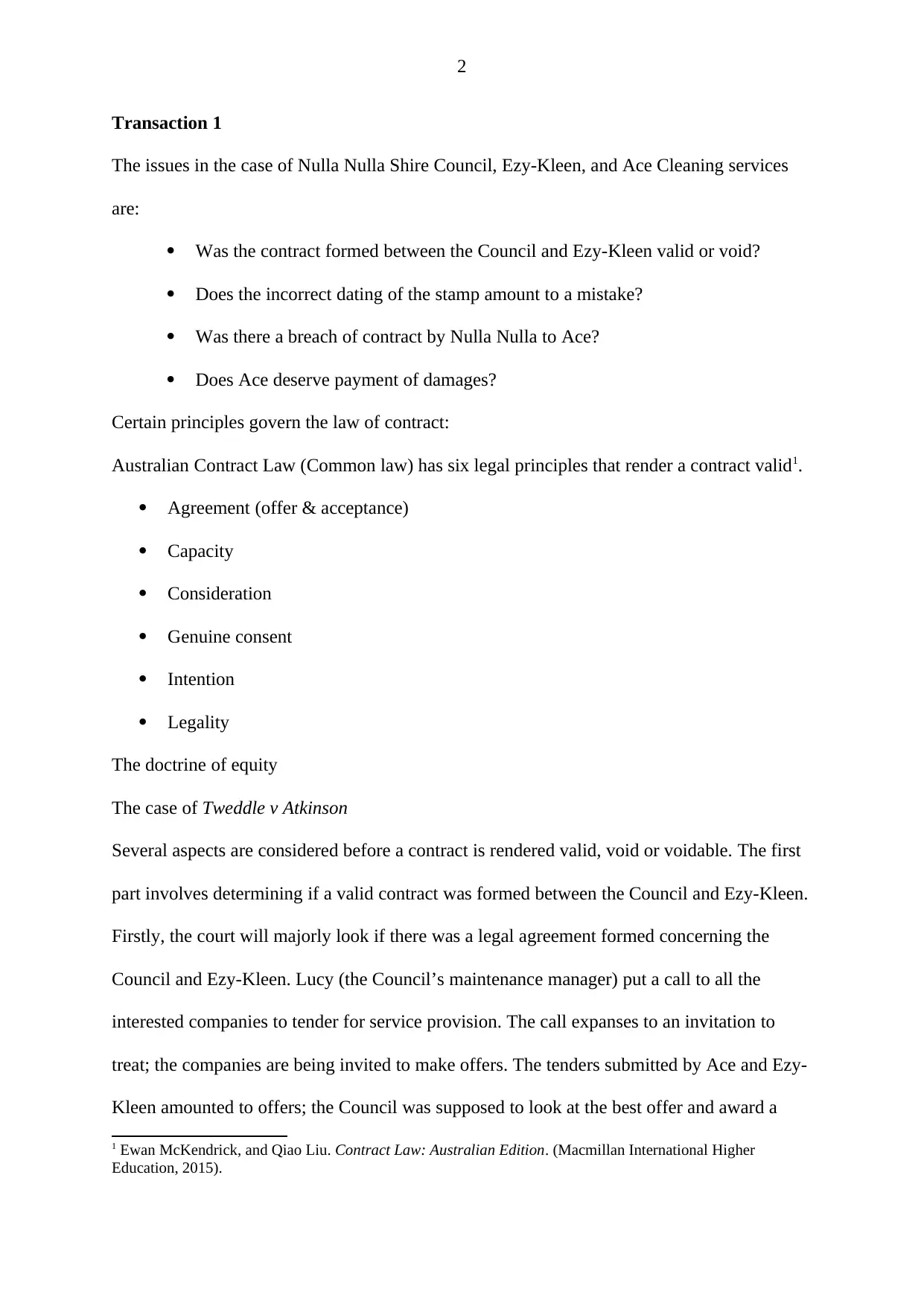
2
Transaction 1
The issues in the case of Nulla Nulla Shire Council, Ezy-Kleen, and Ace Cleaning services
are:
Was the contract formed between the Council and Ezy-Kleen valid or void?
Does the incorrect dating of the stamp amount to a mistake?
Was there a breach of contract by Nulla Nulla to Ace?
Does Ace deserve payment of damages?
Certain principles govern the law of contract:
Australian Contract Law (Common law) has six legal principles that render a contract valid1.
Agreement (offer & acceptance)
Capacity
Consideration
Genuine consent
Intention
Legality
The doctrine of equity
The case of Tweddle v Atkinson
Several aspects are considered before a contract is rendered valid, void or voidable. The first
part involves determining if a valid contract was formed between the Council and Ezy-Kleen.
Firstly, the court will majorly look if there was a legal agreement formed concerning the
Council and Ezy-Kleen. Lucy (the Council’s maintenance manager) put a call to all the
interested companies to tender for service provision. The call expanses to an invitation to
treat; the companies are being invited to make offers. The tenders submitted by Ace and Ezy-
Kleen amounted to offers; the Council was supposed to look at the best offer and award a
1 Ewan McKendrick, and Qiao Liu. Contract Law: Australian Edition. (Macmillan International Higher
Education, 2015).
Transaction 1
The issues in the case of Nulla Nulla Shire Council, Ezy-Kleen, and Ace Cleaning services
are:
Was the contract formed between the Council and Ezy-Kleen valid or void?
Does the incorrect dating of the stamp amount to a mistake?
Was there a breach of contract by Nulla Nulla to Ace?
Does Ace deserve payment of damages?
Certain principles govern the law of contract:
Australian Contract Law (Common law) has six legal principles that render a contract valid1.
Agreement (offer & acceptance)
Capacity
Consideration
Genuine consent
Intention
Legality
The doctrine of equity
The case of Tweddle v Atkinson
Several aspects are considered before a contract is rendered valid, void or voidable. The first
part involves determining if a valid contract was formed between the Council and Ezy-Kleen.
Firstly, the court will majorly look if there was a legal agreement formed concerning the
Council and Ezy-Kleen. Lucy (the Council’s maintenance manager) put a call to all the
interested companies to tender for service provision. The call expanses to an invitation to
treat; the companies are being invited to make offers. The tenders submitted by Ace and Ezy-
Kleen amounted to offers; the Council was supposed to look at the best offer and award a
1 Ewan McKendrick, and Qiao Liu. Contract Law: Australian Edition. (Macmillan International Higher
Education, 2015).
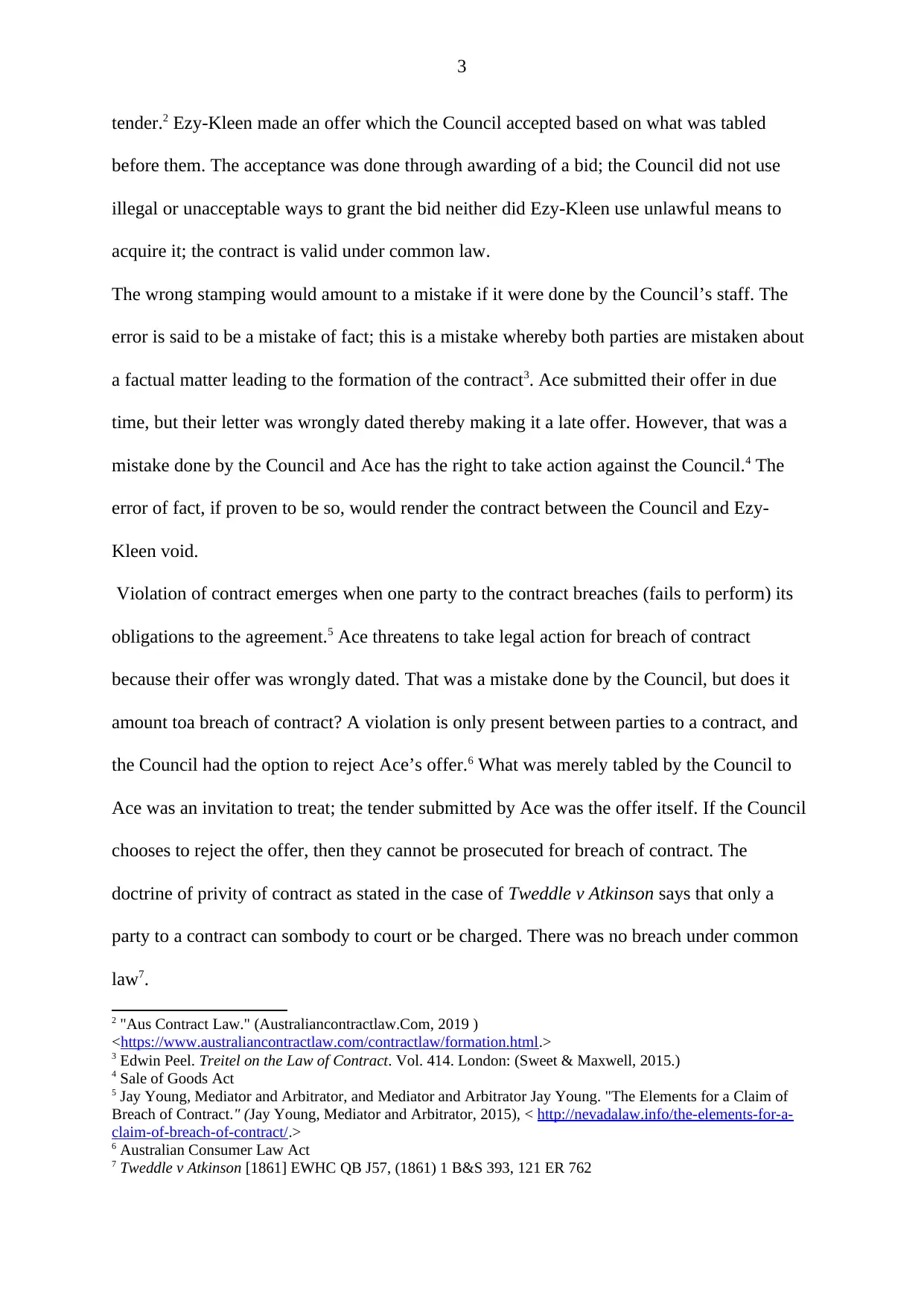
3
tender.2 Ezy-Kleen made an offer which the Council accepted based on what was tabled
before them. The acceptance was done through awarding of a bid; the Council did not use
illegal or unacceptable ways to grant the bid neither did Ezy-Kleen use unlawful means to
acquire it; the contract is valid under common law.
The wrong stamping would amount to a mistake if it were done by the Council’s staff. The
error is said to be a mistake of fact; this is a mistake whereby both parties are mistaken about
a factual matter leading to the formation of the contract3. Ace submitted their offer in due
time, but their letter was wrongly dated thereby making it a late offer. However, that was a
mistake done by the Council and Ace has the right to take action against the Council.4 The
error of fact, if proven to be so, would render the contract between the Council and Ezy-
Kleen void.
Violation of contract emerges when one party to the contract breaches (fails to perform) its
obligations to the agreement.5 Ace threatens to take legal action for breach of contract
because their offer was wrongly dated. That was a mistake done by the Council, but does it
amount toa breach of contract? A violation is only present between parties to a contract, and
the Council had the option to reject Ace’s offer.6 What was merely tabled by the Council to
Ace was an invitation to treat; the tender submitted by Ace was the offer itself. If the Council
chooses to reject the offer, then they cannot be prosecuted for breach of contract. The
doctrine of privity of contract as stated in the case of Tweddle v Atkinson says that only a
party to a contract can sombody to court or be charged. There was no breach under common
law7.
2 "Aus Contract Law." (Australiancontractlaw.Com, 2019 )
<https://www.australiancontractlaw.com/contractlaw/formation.html.>
3 Edwin Peel. Treitel on the Law of Contract. Vol. 414. London: (Sweet & Maxwell, 2015.)
4 Sale of Goods Act
5 Jay Young, Mediator and Arbitrator, and Mediator and Arbitrator Jay Young. "The Elements for a Claim of
Breach of Contract." (Jay Young, Mediator and Arbitrator, 2015), < http://nevadalaw.info/the-elements-for-a-
claim-of-breach-of-contract/.>
6 Australian Consumer Law Act
7 Tweddle v Atkinson [1861] EWHC QB J57, (1861) 1 B&S 393, 121 ER 762
tender.2 Ezy-Kleen made an offer which the Council accepted based on what was tabled
before them. The acceptance was done through awarding of a bid; the Council did not use
illegal or unacceptable ways to grant the bid neither did Ezy-Kleen use unlawful means to
acquire it; the contract is valid under common law.
The wrong stamping would amount to a mistake if it were done by the Council’s staff. The
error is said to be a mistake of fact; this is a mistake whereby both parties are mistaken about
a factual matter leading to the formation of the contract3. Ace submitted their offer in due
time, but their letter was wrongly dated thereby making it a late offer. However, that was a
mistake done by the Council and Ace has the right to take action against the Council.4 The
error of fact, if proven to be so, would render the contract between the Council and Ezy-
Kleen void.
Violation of contract emerges when one party to the contract breaches (fails to perform) its
obligations to the agreement.5 Ace threatens to take legal action for breach of contract
because their offer was wrongly dated. That was a mistake done by the Council, but does it
amount toa breach of contract? A violation is only present between parties to a contract, and
the Council had the option to reject Ace’s offer.6 What was merely tabled by the Council to
Ace was an invitation to treat; the tender submitted by Ace was the offer itself. If the Council
chooses to reject the offer, then they cannot be prosecuted for breach of contract. The
doctrine of privity of contract as stated in the case of Tweddle v Atkinson says that only a
party to a contract can sombody to court or be charged. There was no breach under common
law7.
2 "Aus Contract Law." (Australiancontractlaw.Com, 2019 )
<https://www.australiancontractlaw.com/contractlaw/formation.html.>
3 Edwin Peel. Treitel on the Law of Contract. Vol. 414. London: (Sweet & Maxwell, 2015.)
4 Sale of Goods Act
5 Jay Young, Mediator and Arbitrator, and Mediator and Arbitrator Jay Young. "The Elements for a Claim of
Breach of Contract." (Jay Young, Mediator and Arbitrator, 2015), < http://nevadalaw.info/the-elements-for-a-
claim-of-breach-of-contract/.>
6 Australian Consumer Law Act
7 Tweddle v Atkinson [1861] EWHC QB J57, (1861) 1 B&S 393, 121 ER 762
⊘ This is a preview!⊘
Do you want full access?
Subscribe today to unlock all pages.

Trusted by 1+ million students worldwide
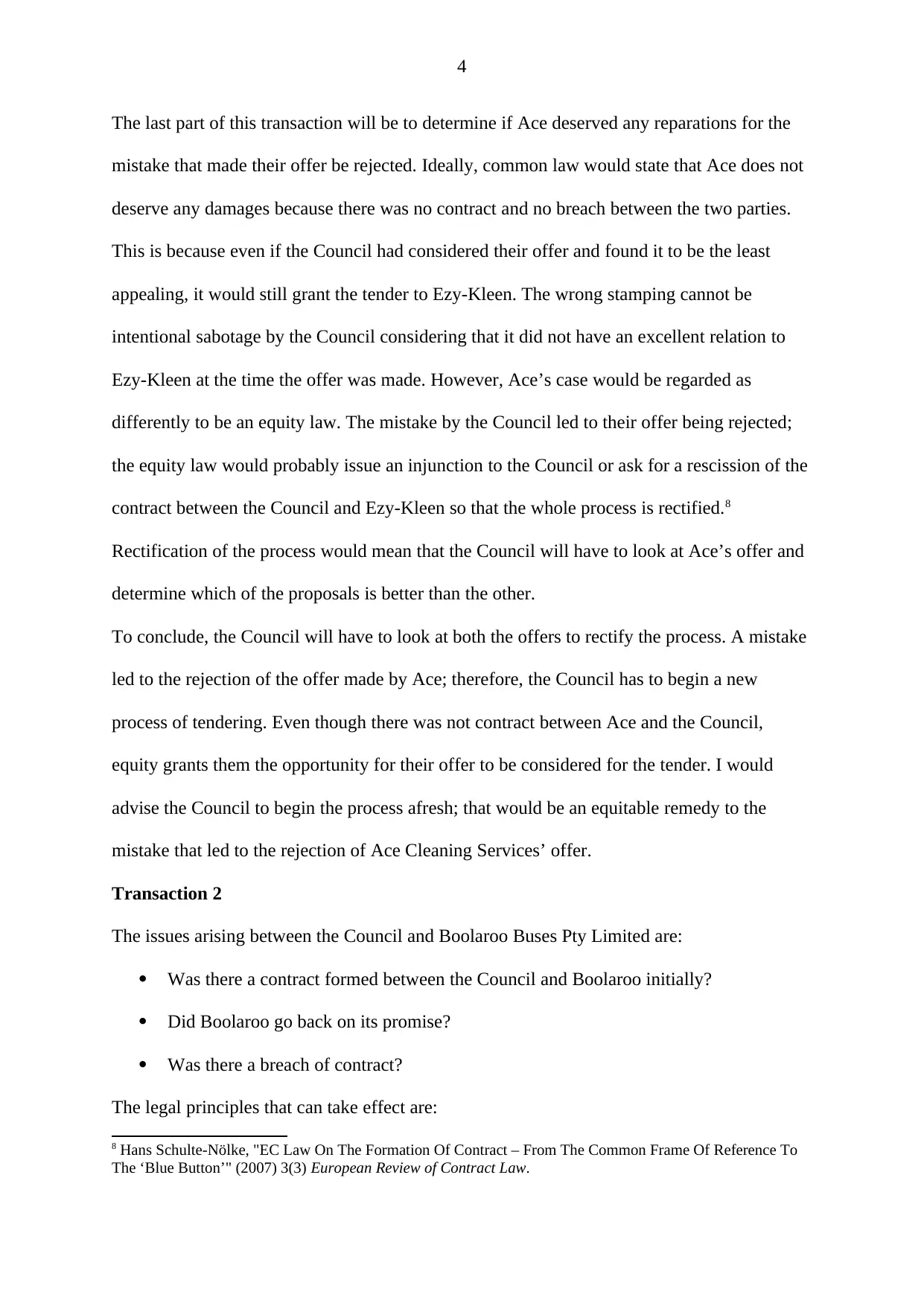
4
The last part of this transaction will be to determine if Ace deserved any reparations for the
mistake that made their offer be rejected. Ideally, common law would state that Ace does not
deserve any damages because there was no contract and no breach between the two parties.
This is because even if the Council had considered their offer and found it to be the least
appealing, it would still grant the tender to Ezy-Kleen. The wrong stamping cannot be
intentional sabotage by the Council considering that it did not have an excellent relation to
Ezy-Kleen at the time the offer was made. However, Ace’s case would be regarded as
differently to be an equity law. The mistake by the Council led to their offer being rejected;
the equity law would probably issue an injunction to the Council or ask for a rescission of the
contract between the Council and Ezy-Kleen so that the whole process is rectified.8
Rectification of the process would mean that the Council will have to look at Ace’s offer and
determine which of the proposals is better than the other.
To conclude, the Council will have to look at both the offers to rectify the process. A mistake
led to the rejection of the offer made by Ace; therefore, the Council has to begin a new
process of tendering. Even though there was not contract between Ace and the Council,
equity grants them the opportunity for their offer to be considered for the tender. I would
advise the Council to begin the process afresh; that would be an equitable remedy to the
mistake that led to the rejection of Ace Cleaning Services’ offer.
Transaction 2
The issues arising between the Council and Boolaroo Buses Pty Limited are:
Was there a contract formed between the Council and Boolaroo initially?
Did Boolaroo go back on its promise?
Was there a breach of contract?
The legal principles that can take effect are:
8 Hans Schulte-Nölke, "EC Law On The Formation Of Contract – From The Common Frame Of Reference To
The ‘Blue Button’" (2007) 3(3) European Review of Contract Law.
The last part of this transaction will be to determine if Ace deserved any reparations for the
mistake that made their offer be rejected. Ideally, common law would state that Ace does not
deserve any damages because there was no contract and no breach between the two parties.
This is because even if the Council had considered their offer and found it to be the least
appealing, it would still grant the tender to Ezy-Kleen. The wrong stamping cannot be
intentional sabotage by the Council considering that it did not have an excellent relation to
Ezy-Kleen at the time the offer was made. However, Ace’s case would be regarded as
differently to be an equity law. The mistake by the Council led to their offer being rejected;
the equity law would probably issue an injunction to the Council or ask for a rescission of the
contract between the Council and Ezy-Kleen so that the whole process is rectified.8
Rectification of the process would mean that the Council will have to look at Ace’s offer and
determine which of the proposals is better than the other.
To conclude, the Council will have to look at both the offers to rectify the process. A mistake
led to the rejection of the offer made by Ace; therefore, the Council has to begin a new
process of tendering. Even though there was not contract between Ace and the Council,
equity grants them the opportunity for their offer to be considered for the tender. I would
advise the Council to begin the process afresh; that would be an equitable remedy to the
mistake that led to the rejection of Ace Cleaning Services’ offer.
Transaction 2
The issues arising between the Council and Boolaroo Buses Pty Limited are:
Was there a contract formed between the Council and Boolaroo initially?
Did Boolaroo go back on its promise?
Was there a breach of contract?
The legal principles that can take effect are:
8 Hans Schulte-Nölke, "EC Law On The Formation Of Contract – From The Common Frame Of Reference To
The ‘Blue Button’" (2007) 3(3) European Review of Contract Law.
Paraphrase This Document
Need a fresh take? Get an instant paraphrase of this document with our AI Paraphraser
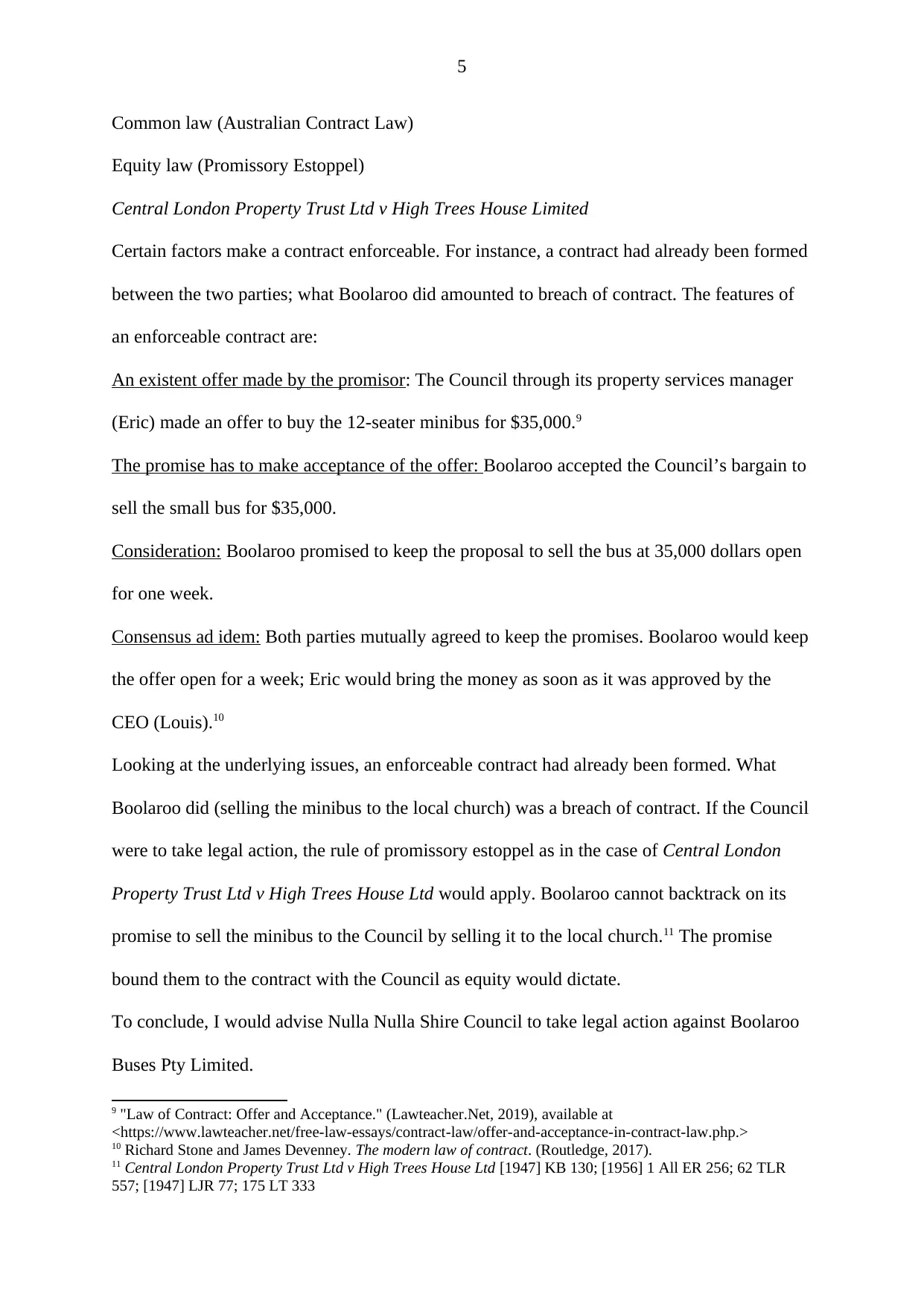
5
Common law (Australian Contract Law)
Equity law (Promissory Estoppel)
Central London Property Trust Ltd v High Trees House Limited
Certain factors make a contract enforceable. For instance, a contract had already been formed
between the two parties; what Boolaroo did amounted to breach of contract. The features of
an enforceable contract are:
An existent offer made by the promisor: The Council through its property services manager
(Eric) made an offer to buy the 12-seater minibus for $35,000.9
The promise has to make acceptance of the offer: Boolaroo accepted the Council’s bargain to
sell the small bus for $35,000.
Consideration: Boolaroo promised to keep the proposal to sell the bus at 35,000 dollars open
for one week.
Consensus ad idem: Both parties mutually agreed to keep the promises. Boolaroo would keep
the offer open for a week; Eric would bring the money as soon as it was approved by the
CEO (Louis).10
Looking at the underlying issues, an enforceable contract had already been formed. What
Boolaroo did (selling the minibus to the local church) was a breach of contract. If the Council
were to take legal action, the rule of promissory estoppel as in the case of Central London
Property Trust Ltd v High Trees House Ltd would apply. Boolaroo cannot backtrack on its
promise to sell the minibus to the Council by selling it to the local church.11 The promise
bound them to the contract with the Council as equity would dictate.
To conclude, I would advise Nulla Nulla Shire Council to take legal action against Boolaroo
Buses Pty Limited.
9 "Law of Contract: Offer and Acceptance." (Lawteacher.Net, 2019), available at
<https://www.lawteacher.net/free-law-essays/contract-law/offer-and-acceptance-in-contract-law.php.>
10 Richard Stone and James Devenney. The modern law of contract. (Routledge, 2017).
11 Central London Property Trust Ltd v High Trees House Ltd [1947] KB 130; [1956] 1 All ER 256; 62 TLR
557; [1947] LJR 77; 175 LT 333
Common law (Australian Contract Law)
Equity law (Promissory Estoppel)
Central London Property Trust Ltd v High Trees House Limited
Certain factors make a contract enforceable. For instance, a contract had already been formed
between the two parties; what Boolaroo did amounted to breach of contract. The features of
an enforceable contract are:
An existent offer made by the promisor: The Council through its property services manager
(Eric) made an offer to buy the 12-seater minibus for $35,000.9
The promise has to make acceptance of the offer: Boolaroo accepted the Council’s bargain to
sell the small bus for $35,000.
Consideration: Boolaroo promised to keep the proposal to sell the bus at 35,000 dollars open
for one week.
Consensus ad idem: Both parties mutually agreed to keep the promises. Boolaroo would keep
the offer open for a week; Eric would bring the money as soon as it was approved by the
CEO (Louis).10
Looking at the underlying issues, an enforceable contract had already been formed. What
Boolaroo did (selling the minibus to the local church) was a breach of contract. If the Council
were to take legal action, the rule of promissory estoppel as in the case of Central London
Property Trust Ltd v High Trees House Ltd would apply. Boolaroo cannot backtrack on its
promise to sell the minibus to the Council by selling it to the local church.11 The promise
bound them to the contract with the Council as equity would dictate.
To conclude, I would advise Nulla Nulla Shire Council to take legal action against Boolaroo
Buses Pty Limited.
9 "Law of Contract: Offer and Acceptance." (Lawteacher.Net, 2019), available at
<https://www.lawteacher.net/free-law-essays/contract-law/offer-and-acceptance-in-contract-law.php.>
10 Richard Stone and James Devenney. The modern law of contract. (Routledge, 2017).
11 Central London Property Trust Ltd v High Trees House Ltd [1947] KB 130; [1956] 1 All ER 256; 62 TLR
557; [1947] LJR 77; 175 LT 333
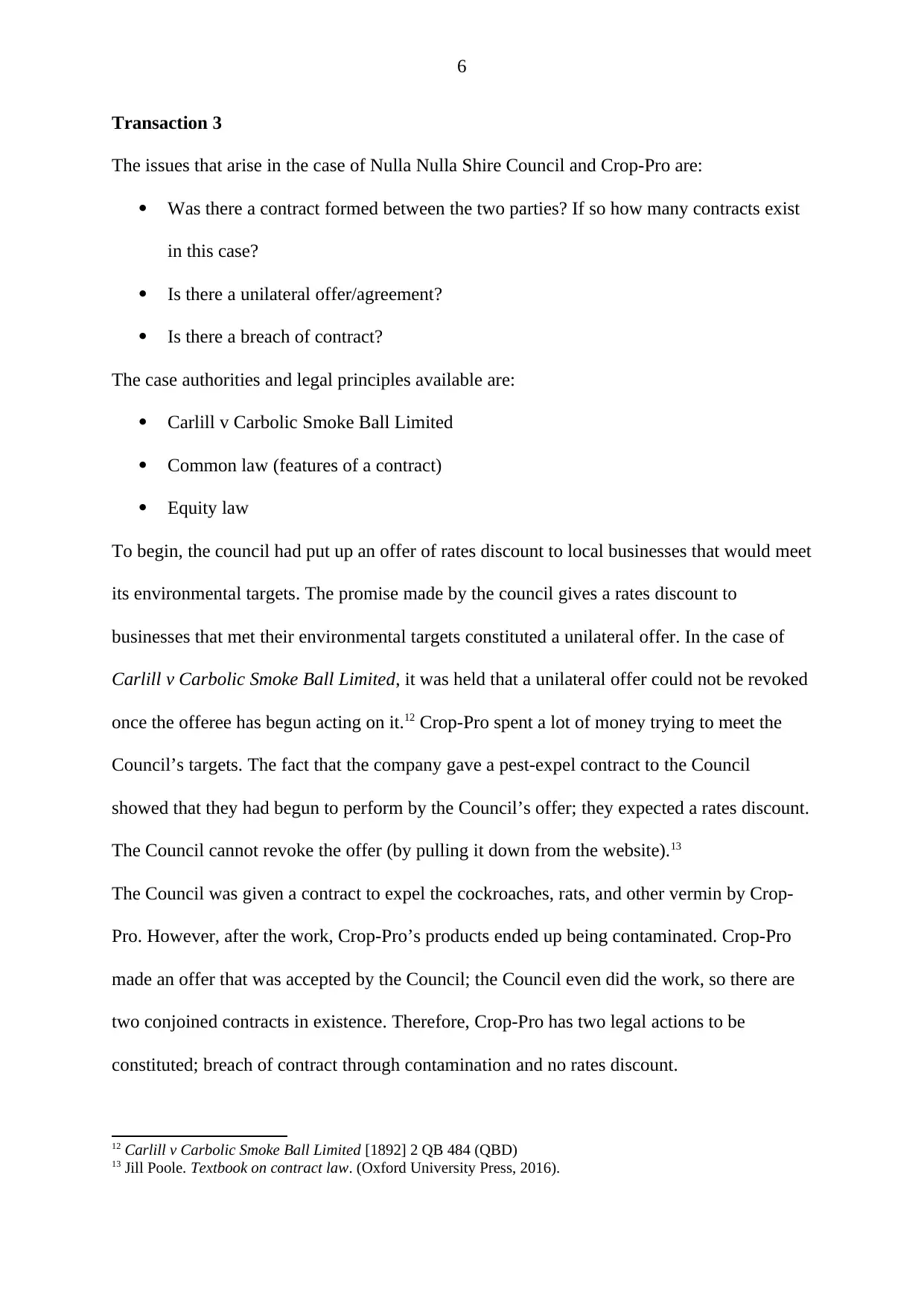
6
Transaction 3
The issues that arise in the case of Nulla Nulla Shire Council and Crop-Pro are:
Was there a contract formed between the two parties? If so how many contracts exist
in this case?
Is there a unilateral offer/agreement?
Is there a breach of contract?
The case authorities and legal principles available are:
Carlill v Carbolic Smoke Ball Limited
Common law (features of a contract)
Equity law
To begin, the council had put up an offer of rates discount to local businesses that would meet
its environmental targets. The promise made by the council gives a rates discount to
businesses that met their environmental targets constituted a unilateral offer. In the case of
Carlill v Carbolic Smoke Ball Limited, it was held that a unilateral offer could not be revoked
once the offeree has begun acting on it.12 Crop-Pro spent a lot of money trying to meet the
Council’s targets. The fact that the company gave a pest-expel contract to the Council
showed that they had begun to perform by the Council’s offer; they expected a rates discount.
The Council cannot revoke the offer (by pulling it down from the website).13
The Council was given a contract to expel the cockroaches, rats, and other vermin by Crop-
Pro. However, after the work, Crop-Pro’s products ended up being contaminated. Crop-Pro
made an offer that was accepted by the Council; the Council even did the work, so there are
two conjoined contracts in existence. Therefore, Crop-Pro has two legal actions to be
constituted; breach of contract through contamination and no rates discount.
12 Carlill v Carbolic Smoke Ball Limited [1892] 2 QB 484 (QBD)
13 Jill Poole. Textbook on contract law. (Oxford University Press, 2016).
Transaction 3
The issues that arise in the case of Nulla Nulla Shire Council and Crop-Pro are:
Was there a contract formed between the two parties? If so how many contracts exist
in this case?
Is there a unilateral offer/agreement?
Is there a breach of contract?
The case authorities and legal principles available are:
Carlill v Carbolic Smoke Ball Limited
Common law (features of a contract)
Equity law
To begin, the council had put up an offer of rates discount to local businesses that would meet
its environmental targets. The promise made by the council gives a rates discount to
businesses that met their environmental targets constituted a unilateral offer. In the case of
Carlill v Carbolic Smoke Ball Limited, it was held that a unilateral offer could not be revoked
once the offeree has begun acting on it.12 Crop-Pro spent a lot of money trying to meet the
Council’s targets. The fact that the company gave a pest-expel contract to the Council
showed that they had begun to perform by the Council’s offer; they expected a rates discount.
The Council cannot revoke the offer (by pulling it down from the website).13
The Council was given a contract to expel the cockroaches, rats, and other vermin by Crop-
Pro. However, after the work, Crop-Pro’s products ended up being contaminated. Crop-Pro
made an offer that was accepted by the Council; the Council even did the work, so there are
two conjoined contracts in existence. Therefore, Crop-Pro has two legal actions to be
constituted; breach of contract through contamination and no rates discount.
12 Carlill v Carbolic Smoke Ball Limited [1892] 2 QB 484 (QBD)
13 Jill Poole. Textbook on contract law. (Oxford University Press, 2016).
⊘ This is a preview!⊘
Do you want full access?
Subscribe today to unlock all pages.

Trusted by 1+ million students worldwide
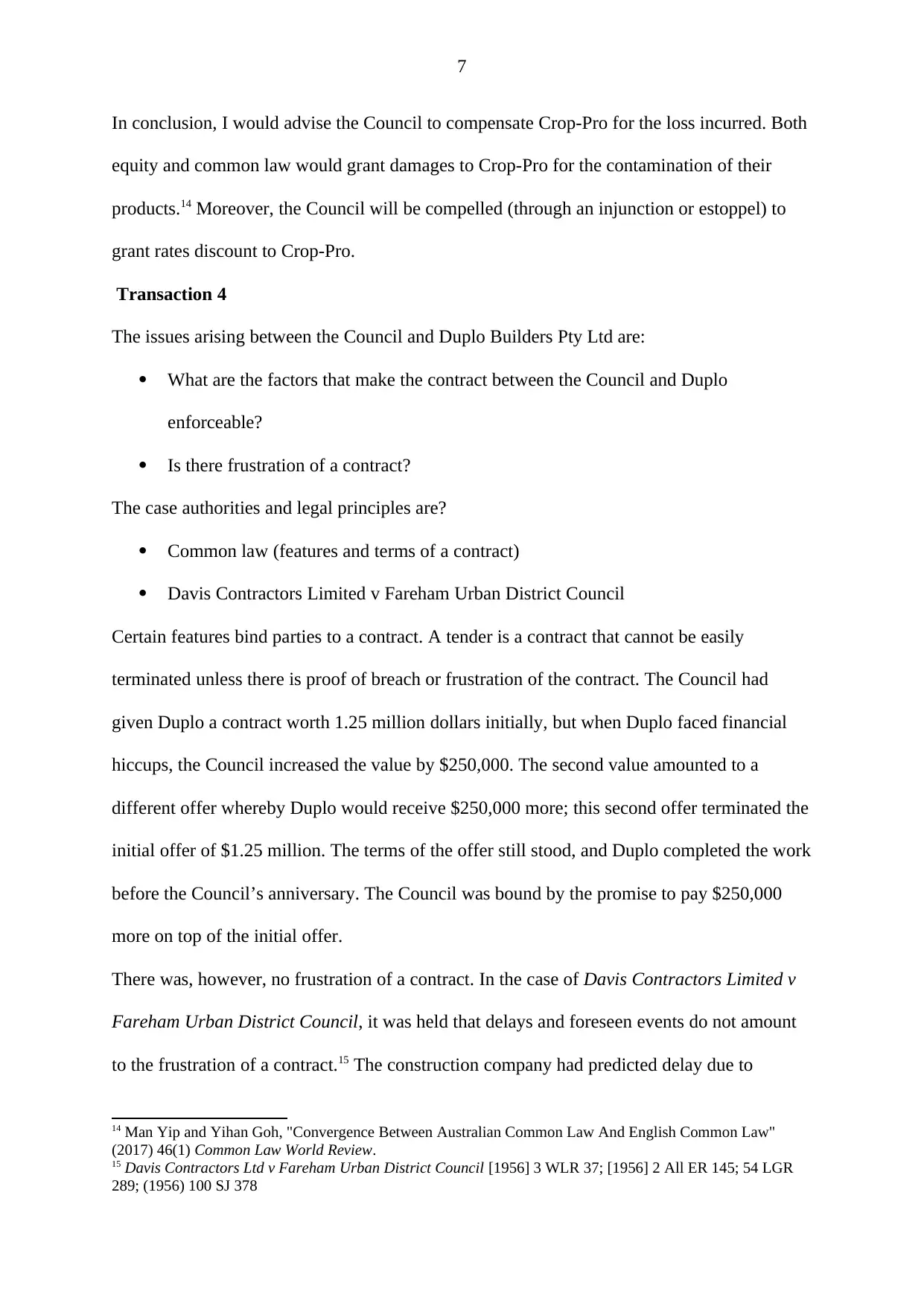
7
In conclusion, I would advise the Council to compensate Crop-Pro for the loss incurred. Both
equity and common law would grant damages to Crop-Pro for the contamination of their
products.14 Moreover, the Council will be compelled (through an injunction or estoppel) to
grant rates discount to Crop-Pro.
Transaction 4
The issues arising between the Council and Duplo Builders Pty Ltd are:
What are the factors that make the contract between the Council and Duplo
enforceable?
Is there frustration of a contract?
The case authorities and legal principles are?
Common law (features and terms of a contract)
Davis Contractors Limited v Fareham Urban District Council
Certain features bind parties to a contract. A tender is a contract that cannot be easily
terminated unless there is proof of breach or frustration of the contract. The Council had
given Duplo a contract worth 1.25 million dollars initially, but when Duplo faced financial
hiccups, the Council increased the value by $250,000. The second value amounted to a
different offer whereby Duplo would receive $250,000 more; this second offer terminated the
initial offer of $1.25 million. The terms of the offer still stood, and Duplo completed the work
before the Council’s anniversary. The Council was bound by the promise to pay $250,000
more on top of the initial offer.
There was, however, no frustration of a contract. In the case of Davis Contractors Limited v
Fareham Urban District Council, it was held that delays and foreseen events do not amount
to the frustration of a contract.15 The construction company had predicted delay due to
14 Man Yip and Yihan Goh, "Convergence Between Australian Common Law And English Common Law"
(2017) 46(1) Common Law World Review.
15 Davis Contractors Ltd v Fareham Urban District Council [1956] 3 WLR 37; [1956] 2 All ER 145; 54 LGR
289; (1956) 100 SJ 378
In conclusion, I would advise the Council to compensate Crop-Pro for the loss incurred. Both
equity and common law would grant damages to Crop-Pro for the contamination of their
products.14 Moreover, the Council will be compelled (through an injunction or estoppel) to
grant rates discount to Crop-Pro.
Transaction 4
The issues arising between the Council and Duplo Builders Pty Ltd are:
What are the factors that make the contract between the Council and Duplo
enforceable?
Is there frustration of a contract?
The case authorities and legal principles are?
Common law (features and terms of a contract)
Davis Contractors Limited v Fareham Urban District Council
Certain features bind parties to a contract. A tender is a contract that cannot be easily
terminated unless there is proof of breach or frustration of the contract. The Council had
given Duplo a contract worth 1.25 million dollars initially, but when Duplo faced financial
hiccups, the Council increased the value by $250,000. The second value amounted to a
different offer whereby Duplo would receive $250,000 more; this second offer terminated the
initial offer of $1.25 million. The terms of the offer still stood, and Duplo completed the work
before the Council’s anniversary. The Council was bound by the promise to pay $250,000
more on top of the initial offer.
There was, however, no frustration of a contract. In the case of Davis Contractors Limited v
Fareham Urban District Council, it was held that delays and foreseen events do not amount
to the frustration of a contract.15 The construction company had predicted delay due to
14 Man Yip and Yihan Goh, "Convergence Between Australian Common Law And English Common Law"
(2017) 46(1) Common Law World Review.
15 Davis Contractors Ltd v Fareham Urban District Council [1956] 3 WLR 37; [1956] 2 All ER 145; 54 LGR
289; (1956) 100 SJ 378
Paraphrase This Document
Need a fresh take? Get an instant paraphrase of this document with our AI Paraphraser
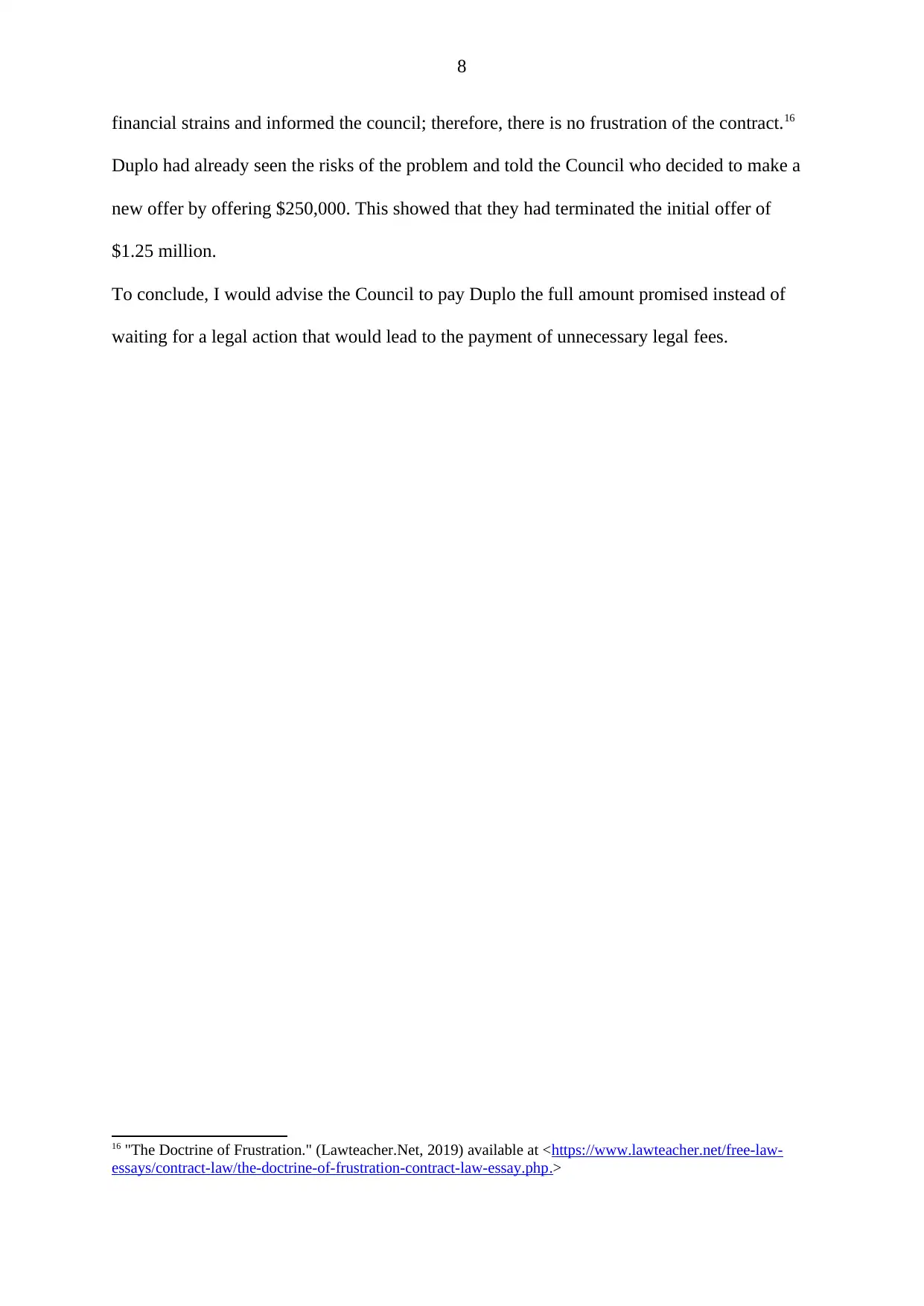
8
financial strains and informed the council; therefore, there is no frustration of the contract.16
Duplo had already seen the risks of the problem and told the Council who decided to make a
new offer by offering $250,000. This showed that they had terminated the initial offer of
$1.25 million.
To conclude, I would advise the Council to pay Duplo the full amount promised instead of
waiting for a legal action that would lead to the payment of unnecessary legal fees.
16 "The Doctrine of Frustration." (Lawteacher.Net, 2019) available at <https://www.lawteacher.net/free-law-
essays/contract-law/the-doctrine-of-frustration-contract-law-essay.php.>
financial strains and informed the council; therefore, there is no frustration of the contract.16
Duplo had already seen the risks of the problem and told the Council who decided to make a
new offer by offering $250,000. This showed that they had terminated the initial offer of
$1.25 million.
To conclude, I would advise the Council to pay Duplo the full amount promised instead of
waiting for a legal action that would lead to the payment of unnecessary legal fees.
16 "The Doctrine of Frustration." (Lawteacher.Net, 2019) available at <https://www.lawteacher.net/free-law-
essays/contract-law/the-doctrine-of-frustration-contract-law-essay.php.>
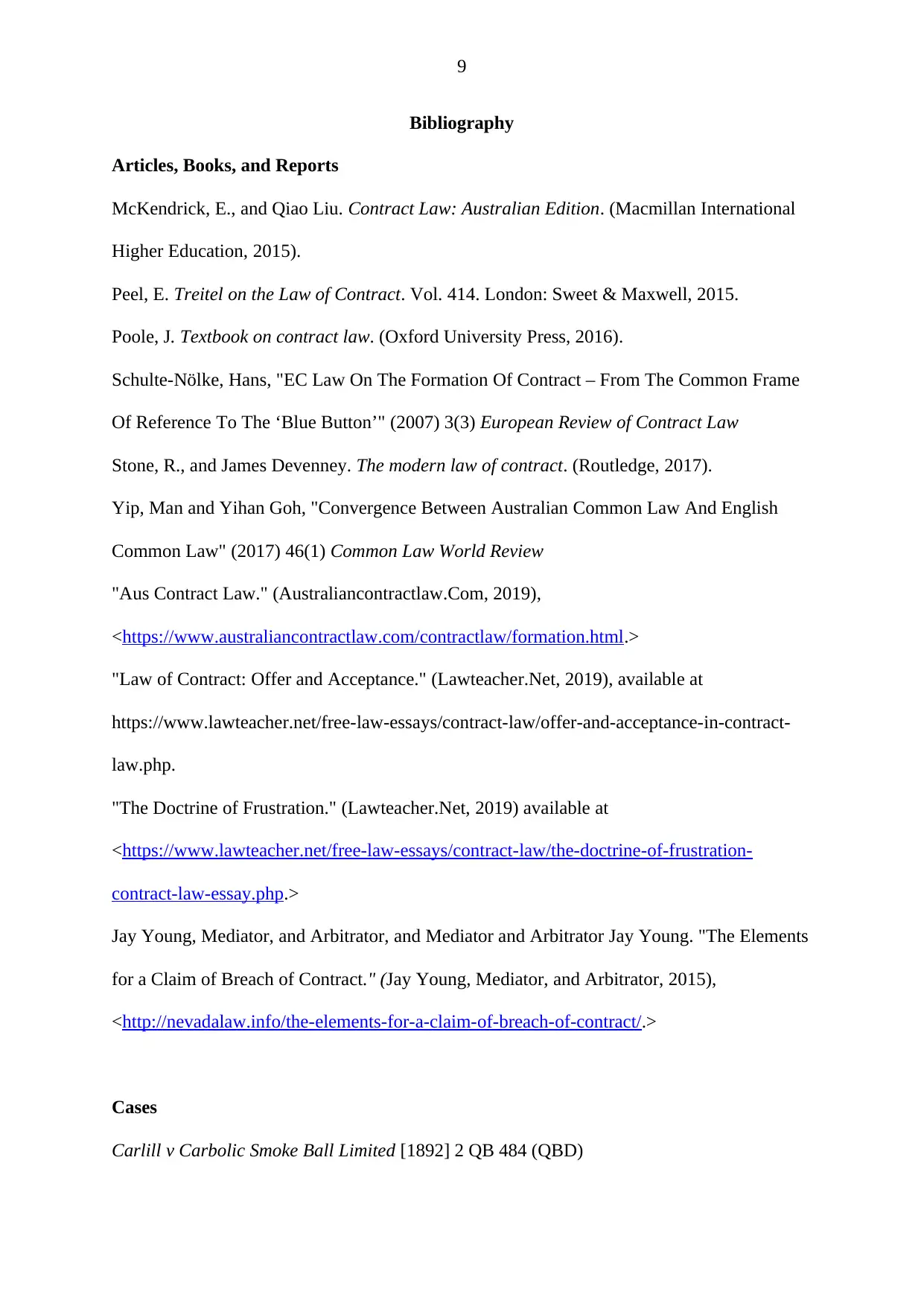
9
Bibliography
Articles, Books, and Reports
McKendrick, E., and Qiao Liu. Contract Law: Australian Edition. (Macmillan International
Higher Education, 2015).
Peel, E. Treitel on the Law of Contract. Vol. 414. London: Sweet & Maxwell, 2015.
Poole, J. Textbook on contract law. (Oxford University Press, 2016).
Schulte-Nölke, Hans, "EC Law On The Formation Of Contract – From The Common Frame
Of Reference To The ‘Blue Button’" (2007) 3(3) European Review of Contract Law
Stone, R., and James Devenney. The modern law of contract. (Routledge, 2017).
Yip, Man and Yihan Goh, "Convergence Between Australian Common Law And English
Common Law" (2017) 46(1) Common Law World Review
"Aus Contract Law." (Australiancontractlaw.Com, 2019),
<https://www.australiancontractlaw.com/contractlaw/formation.html.>
"Law of Contract: Offer and Acceptance." (Lawteacher.Net, 2019), available at
https://www.lawteacher.net/free-law-essays/contract-law/offer-and-acceptance-in-contract-
law.php.
"The Doctrine of Frustration." (Lawteacher.Net, 2019) available at
<https://www.lawteacher.net/free-law-essays/contract-law/the-doctrine-of-frustration-
contract-law-essay.php.>
Jay Young, Mediator, and Arbitrator, and Mediator and Arbitrator Jay Young. "The Elements
for a Claim of Breach of Contract." (Jay Young, Mediator, and Arbitrator, 2015),
<http://nevadalaw.info/the-elements-for-a-claim-of-breach-of-contract/.>
Cases
Carlill v Carbolic Smoke Ball Limited [1892] 2 QB 484 (QBD)
Bibliography
Articles, Books, and Reports
McKendrick, E., and Qiao Liu. Contract Law: Australian Edition. (Macmillan International
Higher Education, 2015).
Peel, E. Treitel on the Law of Contract. Vol. 414. London: Sweet & Maxwell, 2015.
Poole, J. Textbook on contract law. (Oxford University Press, 2016).
Schulte-Nölke, Hans, "EC Law On The Formation Of Contract – From The Common Frame
Of Reference To The ‘Blue Button’" (2007) 3(3) European Review of Contract Law
Stone, R., and James Devenney. The modern law of contract. (Routledge, 2017).
Yip, Man and Yihan Goh, "Convergence Between Australian Common Law And English
Common Law" (2017) 46(1) Common Law World Review
"Aus Contract Law." (Australiancontractlaw.Com, 2019),
<https://www.australiancontractlaw.com/contractlaw/formation.html.>
"Law of Contract: Offer and Acceptance." (Lawteacher.Net, 2019), available at
https://www.lawteacher.net/free-law-essays/contract-law/offer-and-acceptance-in-contract-
law.php.
"The Doctrine of Frustration." (Lawteacher.Net, 2019) available at
<https://www.lawteacher.net/free-law-essays/contract-law/the-doctrine-of-frustration-
contract-law-essay.php.>
Jay Young, Mediator, and Arbitrator, and Mediator and Arbitrator Jay Young. "The Elements
for a Claim of Breach of Contract." (Jay Young, Mediator, and Arbitrator, 2015),
<http://nevadalaw.info/the-elements-for-a-claim-of-breach-of-contract/.>
Cases
Carlill v Carbolic Smoke Ball Limited [1892] 2 QB 484 (QBD)
⊘ This is a preview!⊘
Do you want full access?
Subscribe today to unlock all pages.

Trusted by 1+ million students worldwide
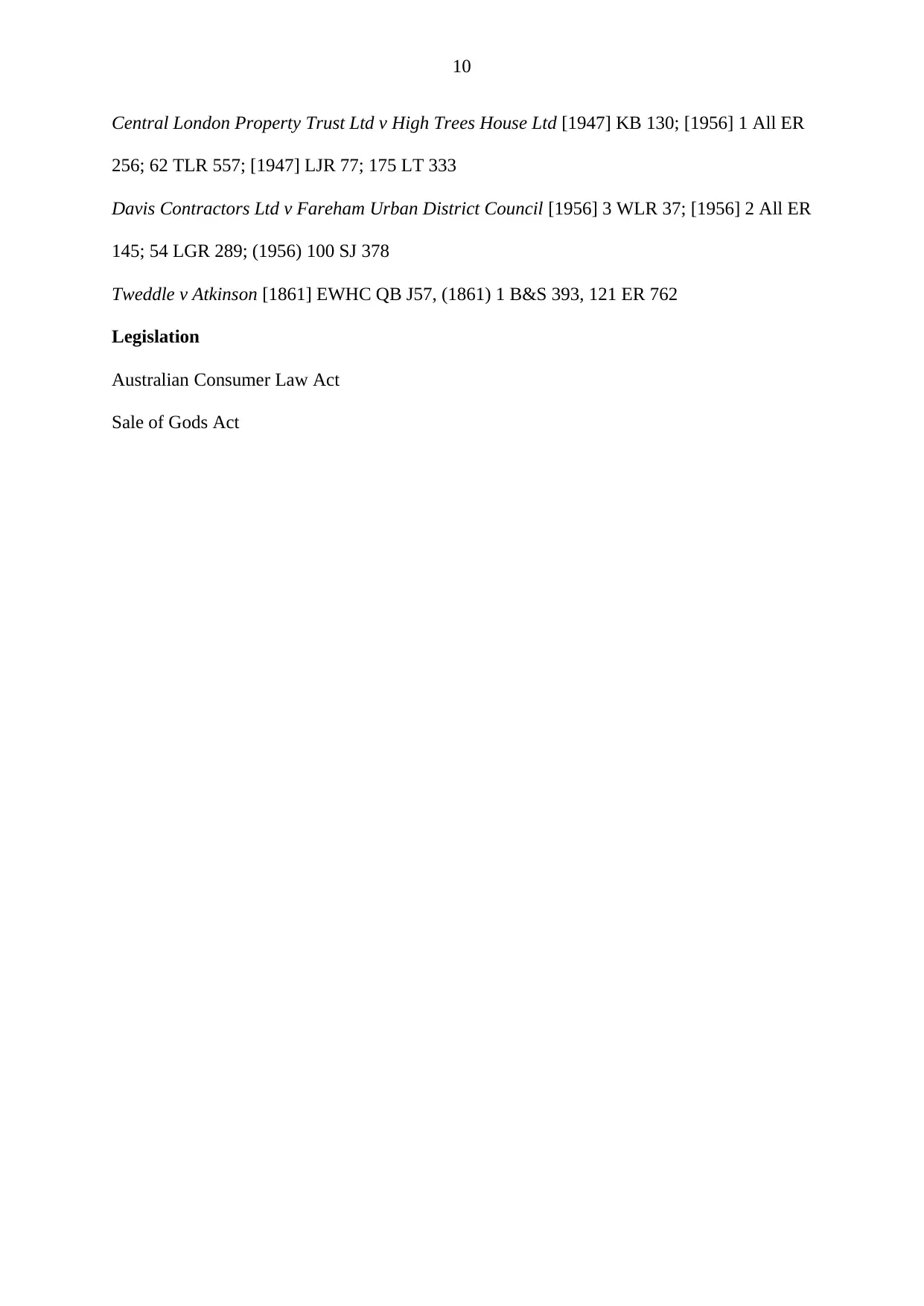
10
Central London Property Trust Ltd v High Trees House Ltd [1947] KB 130; [1956] 1 All ER
256; 62 TLR 557; [1947] LJR 77; 175 LT 333
Davis Contractors Ltd v Fareham Urban District Council [1956] 3 WLR 37; [1956] 2 All ER
145; 54 LGR 289; (1956) 100 SJ 378
Tweddle v Atkinson [1861] EWHC QB J57, (1861) 1 B&S 393, 121 ER 762
Legislation
Australian Consumer Law Act
Sale of Gods Act
Central London Property Trust Ltd v High Trees House Ltd [1947] KB 130; [1956] 1 All ER
256; 62 TLR 557; [1947] LJR 77; 175 LT 333
Davis Contractors Ltd v Fareham Urban District Council [1956] 3 WLR 37; [1956] 2 All ER
145; 54 LGR 289; (1956) 100 SJ 378
Tweddle v Atkinson [1861] EWHC QB J57, (1861) 1 B&S 393, 121 ER 762
Legislation
Australian Consumer Law Act
Sale of Gods Act
1 out of 10
Related Documents
Your All-in-One AI-Powered Toolkit for Academic Success.
+13062052269
info@desklib.com
Available 24*7 on WhatsApp / Email
![[object Object]](/_next/static/media/star-bottom.7253800d.svg)
Unlock your academic potential
Copyright © 2020–2026 A2Z Services. All Rights Reserved. Developed and managed by ZUCOL.





